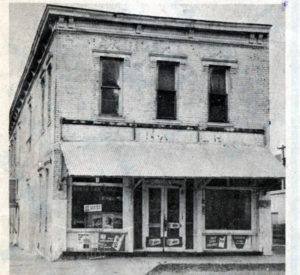World War I not only caused young men to leave Kinsley, but also some of the women. One was Bertha Schnatterly, the granddaughter of Harry and Elizabeth Schnatterly who came to Kinsley in the early 1870s. They had two sons, Milt and Mant and two daughters Mort and Myrt. (I can’t imagine keeping those names straight when you were trying to call one into dinner!)
Harry had a grocery store which his son Milt took over. Bertha was Milt’s daughter. This picture of the store was taken in 1966 before the building was torn down. (It was located on the NW corner of Hwy 56 and Colony).
Bertha was born in 1895 and graduated from Kinsley High School in 1909. She was a talented pianist, gave piano lessons, and was the organist for the Congregational Church. She also sang and acted in local plays. She played an active role in the social scene and is mentioned in the newspapers as hosting and attending showers and being a bridesmaid. However, eight years after graduation, at age 26, she herself was not married. Perhaps she looked at her spinster hat maker aunts, Mort and Myrt, and decided she needed to take her life in a different direction. Perhaps she wanted to contribute to the war effort, or maybe it was the opportunity to earn a living and travel. Whatever motivated her, in the winter of 1917 she attended the Salt City Business College in Hutchinson. When she took the civil service examination, she received the highest grades of any one at the college. According to the Kinsley Graphic of March 28, 1918, she “received an appointment to a clerkship in the adjutant general’s office in Washington, D.C. at $1100 a year, to be raised to $1200 after three months.” On March 30, 1918, she left for Washington, D.C.
The May 2, 1918 issue of the Kinsley Graphic published the following from a letter from Bertha.
“As this is my first visit to Washington, I have had to take the word of those who have lived here for the fact that it is now a very different city than it was a short time ago, but that is very easy to believe. At the present time there are approximately 70,000 new government employees in the city and it is estimated that within a few more months there will be 98,000.
If it were not that the people of Washington had opened their homes, and taken these new clerks into them it is hard to think what would have become of them. But everyone has been very gracious and there are very few homes but what have been opened to the newcomer.
I think that being right at the seat of so much activity makes one realize the war situation more deeply. It is all one hears and there are always so many speeches and talks to be heard on the subject. There are such immense throngs of people that go to hear these that it is necessary to issue tickets for them. These can be had for the asking, but the mere fact that one has to go for them limits the crowd to a certain extent, although there are always many turned away.
…. As for my work, I am very much pleased with it. I find it very enjoyable and certainly have no complaint to make, so that I think I am going to enjoy Washington very much.”
On August 30, Bertha wrote the following update to the editor of the Graphic:
“I think I have neglected writing to you for some time but most of my spare time has been spent in trying to keep cool and comfortable. However, from the temperature reports, I think we have had a more pleasant summer than you people in Kansas.
There were about ten days of exceptionally hot weather, otherwise it has been very pleasant. Washingtonians tell us that it has been an unusual summer as it is generally almost unbearable. The weather man must have known that the town was filled with government clerks who had to stay here.
Government clerks have a reputation for being great loafers, but that is now a thing of the past. That is especially true in the Adjutant General’s office, for we don’t waste any time and the work increases daily. When I first took charge of the desk where I now work I was able to handle the work by myself but in a few weeks I had to ask for an assistant and at present I frequently have the section chief loan me one of his file clerks so we won’t become entirely swamped with work.
My division chief brought me a few cases of tangled papers to straighten out one day and I just happened to have good luck in locating them and was able to send them to the right divisions. Since then, when anything goes astray they send me out on the trail. It is quite troublesome at times but I rather like it as it breaks the monotony of desk work. Some days I am all over the building from attic to subbasement, trying to calm people, for they don’t like it at all if they don’t receive the papers they wish.
Some dormitories are being built on Capitol Hill for the housing of clerks. They are badly needed and will no doubt relieve the congested rooming houses to some extent. They are not far enough along to know what they will look like but they will probably be like the Ordinance building, a temporary structure, to be dynamited after the war.”
I’ll be writing more regarding Bertha’s interesting letters in my next blog.

